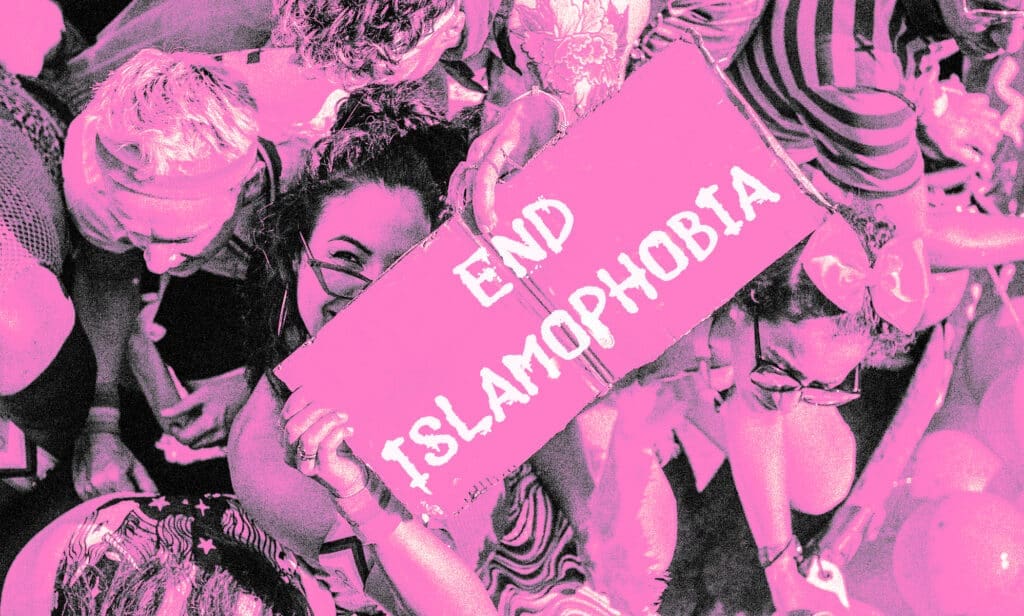Being queer doesn’t excuse your Islamophobia. LGBTQ+ Muslims need your allyship, not bigotry
LGBTQ+ Muslims are made to feel unwelcome, unsafe and unwanted in many LGBTQ+ spaces – and it needs to end, writes Arbër Gashi, ambassador for LGBTQ+ young people’s charity Just Like Us.

Muslim and LGBTQ+ identities are often positioned as polarised in our society, suggested the two cannot mutually exist in one person.
They can, and we do. Our identities, experiences and the way we present ourselves are completely valid.
As a group of people, we often face forms of bigotry, discrimination and threats of all kinds from internal and external communities.
We often face homophobia within our familial and cultural environments, as well as Islamophobia perpetuated by the world around us.
I’ve too often come across Islamophobia within the LGBTQ+ community and spaces.
Some people within these spaces often justify their perpetuation of anti-Muslim bigotry citing the anti-LGBTQ+ legislation and unjust treatment of LGBTQ+ people in certain Muslim-majority countries around the world, which of course is completely unacceptable.
But you cannot use others’ bigotry to justify your own.
What some LGBTQ+ people neglect to recognise is that vilifying whole countries and the religions in them is also inherently negatively affecting those LGBTQ+ people who exist in these environments.
It is also problematic to generalise millions of people, and this further contributes to an Orientalist perspective that homogenises the diversity of Muslim communities and thought.
This bigotry disregards the part the western world, more specifically Britain and its former empire, had in proselytising legislative homophobia through its colonial projects in the 19th century.
This nuance is often negated in LGBTQ+ spaces, and this then has a negative impact on the LGBTQ+ Muslims who are in them. I’ve found the most common kind of Islamophobia is refusing to see us – even claiming that we as LGBTQ+ Muslims can’t exist.
I have myself been undermined, questioned, and picked apart by LGBTQ+ people who desperately seek to comprehend why I still want to “latch onto” my identity as a Muslim. I am therefore considered a “walking contradiction” for identifying with a faith that others regard as “oppressive”, “backwards” and in contrast to anything LGBTQ+.
But things aren’t as black and white as people make them seem, for me and for many Muslim LGBTQ+ people. Our religious identities are inherently interwoven into who we are.
I believe that no one should not be made to feel like they must pick and choose between their faith and being LGBTQ+. As queer people, many of us already experience challenges around coming out and being ourselves – why should we have to prove our authenticity in queer spaces too?
November marks Islamophobia Awareness Month, a time where we should all deconstruct the discriminatory notions of Muslim communities and Islam that we might have absorbed. We should be particularly mindful to bring awareness to those who are further disenfranchised in Muslim communities, specifically LGBTQ+ Muslims.
Muslims were found to be the second ‘least liked’ community in research by the University of Birmingham in 2022. This is indicative of the normalisation of Islamophobia in British society. The Muslim Engagement and Development Group (MEND) has also said that Islamophobia is on a consistent rise in the UK.
This no doubt affects all Muslims in the UK, but more precisely, LGBTQ+ Muslims go on to experience difficulty in navigating oppressive systems that undermine, disrespect, and weaponize both their Muslim and LGBTQ+ identities against them.
In research carried out by Just Like Us, it was found that LGBTQ+ young people are twice as likely to have depression and contemplate suicide than their non-LGBTQ+ peers. It’s clear that we are still a long way from LGBTQ+ equality in Britain – and LGBTQ+ Muslims cannot be ignored in this journey.
We must make sure that spaces are inclusive of all identities. This is something that I was able to find when I joined Just Like Us as an ambassador.
Working alongside the wonderful team at the LGBTQ+ young people’s charity allowed me to come into contact with people from similar ethnic and religious backgrounds, which did in the process improve my self-image and worth – further representative of how important affirming spaces are for people.
If you are an LGBTQ+ Muslim who needs more support in the UK, please do reach out to organisations like Imaan, Hidayah, the Inclusive Mosque Initiative, the Naz and Matt Foundation, and Just Like Us.
I’d also recommend you read up on LGBTQ+ history within Islamic societies – Islamic Homosexualities: Culture, History and Literature by Will Roscoe and Stephen O. Murray, and Homosexuality in Islam by Scott Siraj al-Haqq Kugle are great places to start.
As LGBTQ+ Muslims, we need your support – not your Islamophobia.
